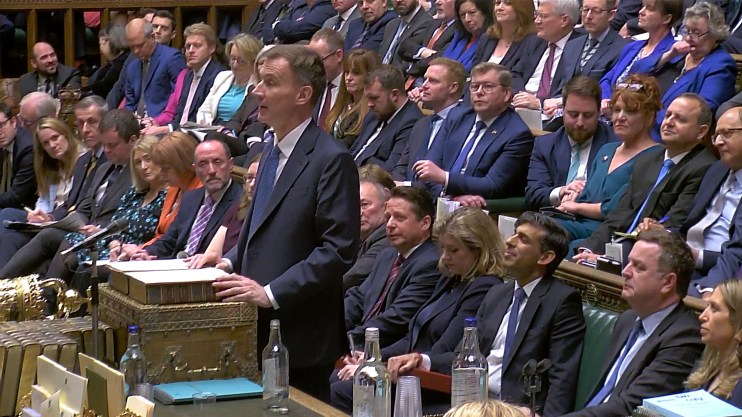‘Largest business tax cut in modern British history’: Hunt makes full expensing permanent

Jeremy Hunt has confirmed British firms are set to benefit from “the largest business tax cut in modern British history” as he announced full expensing would be made permanent.
The Chancellor confirmed the widely reported expansion during a fiscal event aimed at boosting business, turbo-charging investment and turning around Prime Minister Rishi Sunak’s election chances.
He told MPs: “I will today make full expensing permanent.
“This is the largest business tax cut in modern British history. It means we have not just the lowest headline corporation tax rate in the G7 but its most generous capital allowances.”
Full expensing allows firms to offset the full cost of purchasing plant, machinery, technology and IT equipment against their annual profits – instead of spreading it across multiple years.
The Chancellor described the measure as “one of the most generous tax reliefs anywhere in the world… a huge boost to British competitiveness in an Autumn Statement for growth”.
Labour’s shadow chancellor Rachel Reeves said Labour had been “calling” on minister to make full expensing permanent.
“That doesn’t make up for the years of uncertainty that businesses have faced with taxes going up and down like a yo-yo,” she said.
Opening his speech, Hunt said the government’s “plan for the British economy is working but the work is not done” and added that inflation had last week fallen to 4.6 per cent, from the 11.1 per cent when he took office.
He told MPs the Office for Budget Responsibility (OBR) now expects the economy to grow by a downgraded 0.6 per cent this year and 0.7 per cent next year, rising to a predicted peak of two per cent in 2027.
This follows the impact of higher interest rates – but the OBR also predicted inflation would fall further, dropping to 2.8 per cent by the end of 2024.
Hunt also confirmed he would cut the main rate of national insurance (NI) for workers from 12 to 10 per cent as of January.
He told the Commons he would bring forward urgent legislation to Parliament to introduce the NI cut for employees “from January 6, so that people can see the benefit in their payslips at the start of the new year”.
He added: “It means someone on the average salary of £35,000 will save over £450. For the average nurse, it is a saving of over £520 and for the typical police officer it is a saving of over £630 every single year.”
However, the OBR warned in its economic and fiscal outlook that combined inflation and fiscal drag are expected to raise close to £45bn in 2028-29 – around two-thirds of the cost of the entire furlough scheme.
And the public are set to receive back around just a quarter of that, with the two percentage point cut and other NI changes such as to self-employed workers, costing around £10bn.
Reeves criticised the move, telling MPs she has “long argued that taxes on working people are too high”.
“Going into this statement the government had already put in place tax increases worth the equivalent of a 10p increase in national insurance,” she said.
“Today’s 2p cut will not remotely compensate for the tax (increases) already put in place by this Conservative government… taxes will be higher at the next election than they were at the last.”
The Chancellor also unveiled a number of measures to support people with the cost of living.
Benefits will be increased in line with the September inflation figure of 6.7 per cent, while the pensions triple lock will be “honoured in full” from April 2024, with a rise of 8.5 per cent to £221 a week.
Drinkers can also enjoy more of the pound in their pocket, after Hunt confirmed he would freeze duty on all alcohol, as well confirming the Brexit pubs guarantee to ensure a drink in your local is cheaper than from the supermarket.
